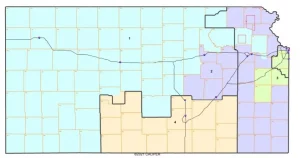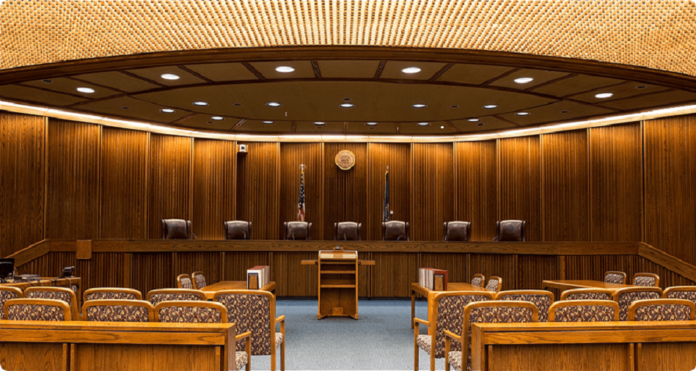(Developing: Will be updated)
The Kansas Supreme Court on Wednesday upheld the state’s new congressional districts, rejecting claims that the new map was drawn in a way to empower Republicans while watering down the political influence of Democratic and minority voters.
The court’s decision, which came less than 48 hours after it heard oral arguments in the case, reverses a Wyandotte County judge’s decision throwing out the state’s congressional boundaries.
“A majority of the court holds that, on the record before us, plaintiffs have not prevailed on their claims that (the map) violates the Kansas Constitution,” Justice Caleb Stegall wrote in a short statement without a more prolonged opinion.
“Therefore, the judgment of the district court is reversed and the permanent injunction ordered by the district court is lifted,” he wrote.
A full opinion describing the facts, rationale and holdings of the court is forthcoming, along with all dissenting or concurring opinions of members of the court, he said.
District Judge Bill Klapper had ruled in a 209-page opinion that the new congressional map authored by Republicans – known as Ad Astra 2 – violated multiple sections of the Kansas Constitution because of partisan and racial gerrymandering.
It was a historic decision for the Supreme Court, which for the first time was asked to decide whether the Kansas Constitution protected voters against gerrymandering.
The new map has distinct political implications, potentially hurting Democratic Congresswoman Sharice Davids’ chances of winning reelection in the 3rd District.
It also undercuts Democrat Patrick Schmidt’s challenge to Congressman Jake LaTurner in the 2nd District.
The new map hurts Davids because it trades out a Democratic area in Wyandotte County for an area that leans more Republican farther south.
The new 3rd District would extend as far south as Anderson, Franklin and Miami counties, where former President Donald Trump won in overwhelming numbers.
Davids had predicted for months that Republicans would use redistricting to force her out of office.
“From rushed hearings to backroom deals for votes, the redistricting process did not instill a sense of transparency or confidence in the people of Kansas,” Davids said in a statement.
“I hope that although many feel their voice was not heard, they do not feel as though their voice does not matter.
“I look forward to introducing myself to the new voters in the Third District, continuing my work to find common ground and tackle the everyday issues facing our community, and showing all Kansans that to me, their voice matters.”
Republican Amanda Adkins, who is challenging Davids in the 3rd District for a second consecutive time, said the map approved by the Supreme Court was “evidence that our democratic process works.”
“I welcome the people of Anderson, Franklin and southern Miami counties to KS-03 and am excited to get to work for the new district, a thriving community of urban, suburban and rural area,” she said in a statement.
The new map also puts the city of Lawrence — a Democratic power base — into the sprawling and largely Republican 1st District represented by Congressman Tracey Mann.
It is believed that moving Lawrence into the 1st District makes an already difficult race for Schmidt even more of a hardship.
Schmidt did not respond to a request for comment.
The plaintiffs challenging the map claimed it gerrymandered the state in the GOP’s favor by splitting Wyandotte and Douglas counties, the state’s two Democratic strongholds with large concentrations of minority voters.
The new plan slices Wyandotte County in half along Interstate 70, with the northern part of the county moved into the 2nd District while the southern part remains in the 3rd District now represented by Davids.
It also moves about 100,000 Lawrence residents out of the 2nd District into the largely agricultural-centered 1st Congressional District that extends to the Colorado border.
The plan moves 113,000 Wyandotte County voters – of which about 72% are minorities – out of the 3rd District into the 2nd District.
An expert for the plaintiffs testified that moving Wyandotte County minority voters into the 2nd District would relegate them to political irrelevance.
The new map makes the 3rd District less diverse, with the white population increasing to 75% compared 67.6% under the old plan.
It makes the 2nd District more diverse by increasing the minority population – but at a price, University of Kansas political scientist Patrick Miller testified.
The 2nd District’s white population falls to 69.8% in the new plan from 79.1% in the old plan. However, the new 2nd District is more favorable to Republicans, he said.
The new 2nd District, for instance, now favors Republicans with the average GOP statewide candidate receiving average of 55% of the vote from 2012-2020.
It increases to 56% of the vote with the new plan.
The Campaign Legal Center called the decision “a slap in the face” to Kansas voters.
“The Kansas Legislature crafted gerrymandered maps that purposefully divide Kansans based on race and political views to serve a political interest instead of the community’s needs,” said Paul Smith, senior vice president of Campaign Legal Center.
Sharon Brett, legal director for the ACLU of Kansas, said she was disappointed by the outcome of the case.
“This will have ripple effects for elections for years to come, and tells entire categories of voters in the state that their rights under our state constitution are meaningless,” she said in a statement.
Republican Attorney General Derek Schmidt praised the decision.
“We have successfully defended every Kansan’s right to equal protection of the law in exercising their right to vote, as well as the public’s right to establish new districts through their elected representatives,” Schmidt said
“It is regrettable that Kansas taxpayers have had to bear the unnecessary cost of successfully defending the duly enacted congressional reapportionment against multiple lawsuits backed by out-of-state activists,” he said.















